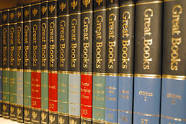Why Use the Schaffer Writing Method?
Wilson Hill Academy uses the Jane Schaffer approach in our Fundamentals of Expository Writing class (School of Logic; grades 7 & 8). Those not familiar with the method may want to know why we use it and how it compares with other commonly used approaches such as Institute for Excellence in Writing (IEW) or the Shurley method. The Schaffer approach is qualitatively different from these other methods, because it guides students into the "Logic" stage
